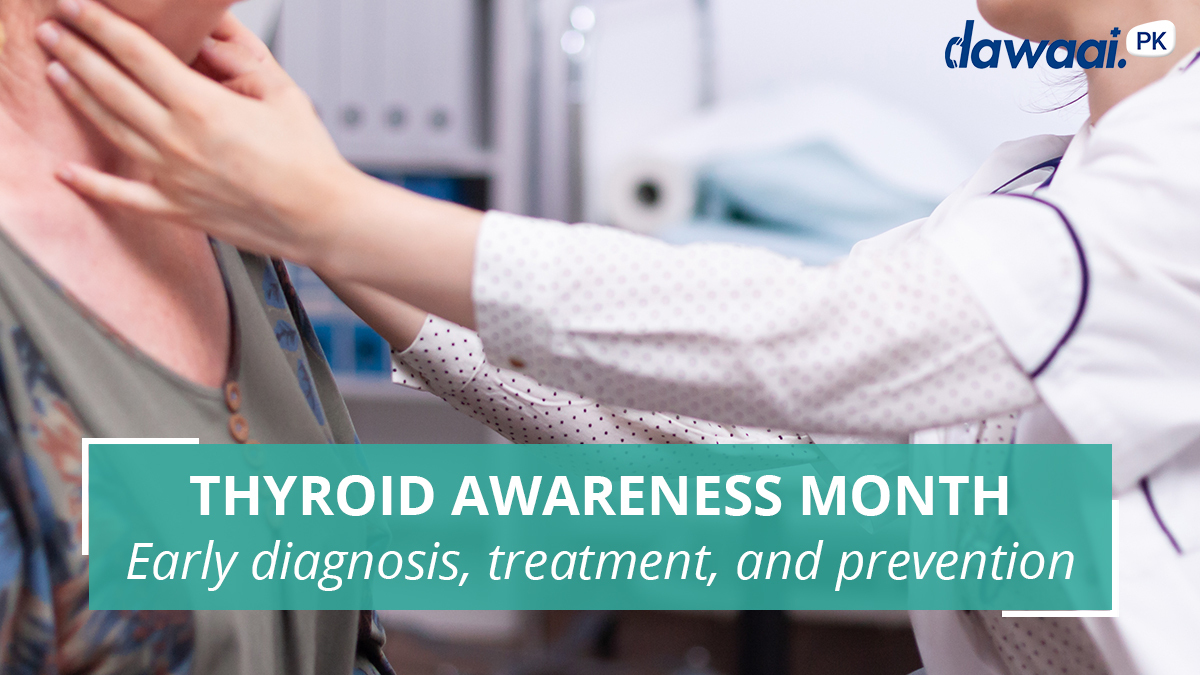Medically reviewed by Dr. Muhammad Ashraf Shera.
Want to learn about thyroid disease in Pakistan? Here’s a blog that discusses thyroid disease symptoms and treatment in Pakistan.
Did you begin feeling joint pain sometime back? Have you struggled with your weight despite eating healthy and limited portions? Do you often feel tired? Then you may be experiencing symptoms of hypothyroidism, the most common thyroid disease in Pakistan.
Thyroid disease in Pakistan affects a huge number of people and a great majority are unaware of it, which is why Thyroid Awareness Month provides an opportunity to learn more about this widespread disease.

(Accuhealthlabs, 2021)
What is Thyroid?
The thyroid gland is a butterfly-shaped gland in your neck, located just above your collarbone. It generates thyroid hormone, which regulates numerous bodily functions, including how quickly you burn calories and how fast your heart beats, all of which are part of your metabolism.
Thyroid in Pakistan affects around 5% to 10% people and often causes long term ailments if left untreated. Therefore, it is important to ensure you stay informed regarding the symptoms and treatment of Thyroid diseases in Pakistan.

(Patientsrising, 2020)
What is Thyroid Disease?
Thyroid disease is an umbrella term for a medical issue that prevents your thyroid from producing the appropriate number of hormones. Normally, the thyroid produces hormones that keep the body running smoothly. When the thyroid produces an excessive amount of thyroid hormone, the body consumes energy at a rapid rate. This is known as hyperthyroidism.
Using too much energy will do more than just make an individual weary but will also cause the heart to beat quicker, cause you to lose weight without even trying, and even make you feel anxious. On the other hand, the thyroid may produce insufficient thyroid hormone. This is known as hypothyroidism. When you have insufficient thyroid hormone in your body, you may feel weary, gain weight, and may even be unable to tolerate cold temperatures.
What are the symptoms of Thyroid Disease?
Hypothyroidism
- Feeling cold
- Weight gain
- Feeling sad, anxious, or depressed
- Pale, dry skin
- Dry, thinning hair
- Irregular menstrual bleeding
- High LDL or “bad” cholesterol which can raise your risk for heart disease
Hyperthyroidism
- Feeling hot
- Weight loss
- Feeling nervous, anxious, or irritable
- Trembling hands and fingers
- Bulging of the eyes, redness, or irritation
- Irregular menstrual periods
- Diarrhea or more bowel movements than normal
Who is affected by thyroid disease?
Thyroid disease in Pakistan can affect anyone, including men, women, newborns, adolescents, and the elderly. It can be present at birth, usually as hypothyroidism, and it can develop as one grows older. Pakistan is known to be one of the severely iodine-deficient countries in the region which is one major reason leading to thyroid dysfunction. Thyroid disease in Pakistan prevails up to 4.1% in adults, and 5.4% in children, and a high prevalence of hypothyroidism and hyperthyroidism in Pakistan is found in females compared to males.
What are the risk factors of thyroid disease?
- Family history
- Have a medical condition (pernicious anemia, type 1 diabetes, lupus, rheumatoid arthritis, etc.)
- Take medication that’s high in iodine
- Are older than 60, especially in women
- Have had treatment for a past thyroid condition or cancer

(Alexanderluriemd, 2021)
What is the treatment?
There is currently no permanent cure for hypothyroidism but proper diet, medication and life style changes can minimize the effects. However, Hyperthyroidism treatment in Pakistan and around the world includes the use of medication that helps patients control their thyroid levels.
In most circumstances, hypothyroidism treatment includes replenishing the quantity of hormone produced by the thyroid. Typically, this is done with medication. The best medicine for thyroid disease in Pakistan is considered to be carbimazole and propylthiouracil. These medicines, when taken orally, increase the amount of thyroid hormone produced by your body, thereby balancing the levels.

(Patientsrising, 2020)
Hypothyroidism is a treatable condition. However, to maintain a normal level of hormones in the body, you must take the prescribed medication regularly. You can live a normal and healthy life with careful management and follow-up checkups with your healthcare provider to ensure your treatment is working properly. And if you’re looking for the best medicine for thyroid in Pakistan, then we strongly advise that you consult a doctor first and then take the prescribed medicine.
By: Sanya Zahid
Citation:
http://www.thepab.org/files/2021/September-2021/PAB-MS-2008-259.pdf
https://my.clevelandclinic.org/health/diseases/12120-hypothyroidism
https://www.healthline.com/health/common-thyroid-disorders
https://www.medicalnewstoday.com/articles/163729#treatment
https://www.saratogahospital.org/Blog/blog-do-you-have-thyroid-disease
https://www.tatahealth.com/article/types-of-thyroid-diseases






